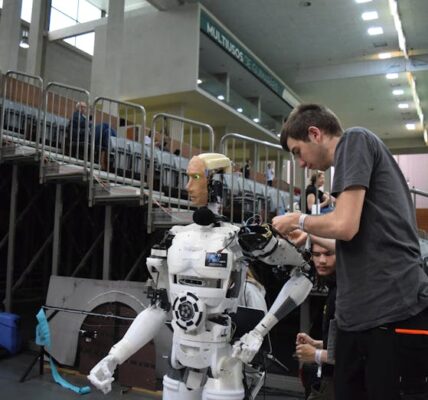Scale AI Prompt Engineer: Mastering the Art of Efficient Scaling
With the increasing demand for artificial intelligence and machine learning, the role of a scale AI prompt engineer has become crucial in optimizing AI models for better performance and efficiency. This profession involves a unique blend of skills, including an understanding of AI algorithms, prompt engineering, and the capability to scale machine learning models effectively.
Understanding the Role of a Scale AI Prompt Engineer
A scale AI prompt engineer is at the forefront of enhancing AI model scalability. This specialized engineer works to ensure that AI systems can handle larger datasets, more complex queries, and increased user loads without compromising performance. They are tasked with designing prompts that help AI understand and process requests more effectively, leading to more reliable and scalable AI solutions.
Key Responsibilities and Skills
The responsibilities of a scale AI prompt engineer include creating detailed specifications for AI prompts, optimizing existing AI models for scalability, and troubleshooting any issues that arise during the scaling process. Essential skills for this role include:
- Technical Proficiency: A strong grasp of AI, machine learning algorithms, and natural language processing is necessary.
- Problem-Solving: The ability to identify and resolve bottlenecks in AI systems.
- Creativity: Crafting prompts that effectively guide AI responses requires a creative approach.
- Communication: Clearly conveying complex technical concepts to team members and stakeholders.
Challenges in Scaling AI Models
Scaling AI models is not without its challenges. As the volume of data and the complexity of tasks increase, prompt engineers must address issues such as:
- Data Management: Ensuring data quality and managing large datasets efficiently.
- Computational Resources: Balancing the need for more computational power with cost constraints.
- Model Generalization: Maintaining the AI model’s performance across different contexts and datasets.
Best Practices for Efficient AI Scaling
To achieve successful scaling, prompt engineers should adhere to several best practices:
Focus on Modular Design
Creating modular prompts and AI components allows for easier scaling and maintenance. This approach also facilitates the reuse of components across different models and applications.
Implement Continuous Integration and Deployment
CI/CD pipelines enable prompt engineers to regularly update AI models and prompts, ensuring that systems can adapt quickly to changing requirements.
Utilize Cloud Computing Resources
Cloud services offer scalable infrastructure, allowing prompt engineers to adjust computational resources based on current needs, without significant upfront investments.
Case Studies: Successful AI Scaling Strategies
Examining case studies of successful AI scaling can provide valuable insights. For instance, a prompt engineer might study how a particular AI chatbot was scaled to handle millions of concurrent users or how an AI-driven recommendation system was expanded to accommodate a growing product catalog.
Tools and Technologies for Scale AI Prompt Engineers
Prompt engineers use a variety of tools to facilitate the scaling process, including:
- Machine Learning Frameworks: TensorFlow, PyTorch, and other frameworks provide the foundation for building scalable AI models.
- Cloud Platforms: AWS, Google Cloud, and Azure offer robust environments for deploying and scaling AI systems.
- Monitoring Tools: Prometheus, Grafana, and similar tools help monitor the performance of scaled AI systems.
In conclusion, the journey to becoming an effective scale AI prompt engineer involves mastering a diverse set of skills and overcoming unique challenges. By following best practices and leveraging the right tools, prompt engineers can ensure that AI systems are not only intelligent but also scalable and reliable.








